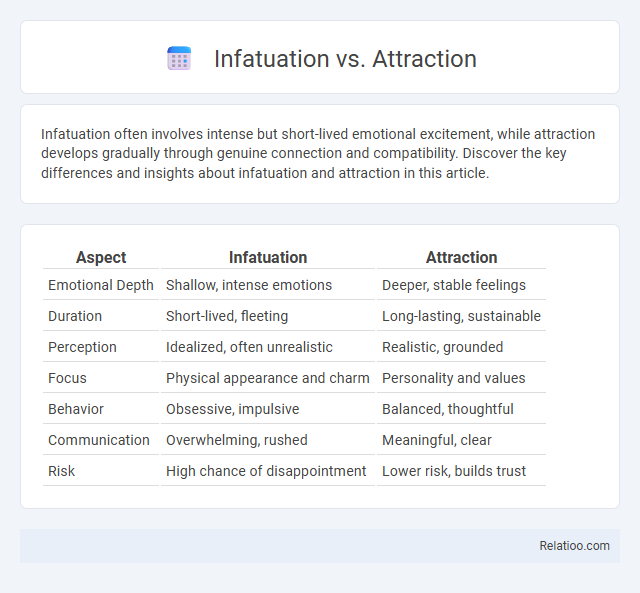Infatuation often involves intense but short-lived emotional excitement, while attraction develops gradually through genuine connection and compatibility. Discover the key differences and insights about infatuation and attraction in this article.
Table of Comparison
| Aspect | Infatuation | Attraction |
|---|---|---|
| Emotional Depth | Shallow, intense emotions | Deeper, stable feelings |
| Duration | Short-lived, fleeting | Long-lasting, sustainable |
| Perception | Idealized, often unrealistic | Realistic, grounded |
| Focus | Physical appearance and charm | Personality and values |
| Behavior | Obsessive, impulsive | Balanced, thoughtful |
| Communication | Overwhelming, rushed | Meaningful, clear |
| Risk | High chance of disappointment | Lower risk, builds trust |
Understanding Infatuation: Definition and Characteristics
Infatuation is an intense but short-lived passion or admiration for someone, often characterized by idealization and emotional excitement without deep knowledge of the person. It differs from attraction, which is a broader and often physical or sexual interest, and from genuine love, which develops over time with mutual understanding and commitment. Key characteristics of infatuation include obsessive thoughts, emotional dependency, and a tendency to overlook flaws, making it a temporary and sometimes irrational state.
What is Attraction? Key Elements Explained
Attraction is a complex psychological and physiological response characterized by interest and desire towards someone or something. Key elements include physical appeal, emotional connection, and intellectual engagement, all of which trigger dopamine and oxytocin release in the brain. Unlike infatuation, which is often intense but short-lived, attraction can develop gradually and sustain long-term relationships based on mutual respect and connection.
Psychological Basis: Infatuation vs. Attraction
Infatuation is characterized by intense, short-lived feelings driven primarily by idealization and emotional arousal, often without a grounded understanding of the other person. Attraction involves a more balanced psychological process influenced by physical appearance, personality traits, and social compatibility, leading to genuine interest and connection. Your ability to distinguish between infatuation and attraction is crucial for making informed decisions about relationships and emotional investment.
Signs of Infatuation: How to Recognize It
Signs of infatuation include intense longing and obsessive thoughts about the person, often without a deep understanding of their true character. Physical symptoms like a racing heart, butterflies in the stomach, and nervousness typically accompany emotional fixation. This emotional state is characterized by idealization, where flaws are overlooked and feelings are disproportionately strong compared to the actual relationship.
Recognizing True Attraction: Subtle Differences
Recognizing true attraction involves distinguishing subtle differences between infatuation and genuine connection, where infatuation is often characterized by intense but short-lived emotions driven by physical appearance or idealization. Attraction, however, encompasses deeper feelings rooted in mutual respect, shared values, and emotional compatibility, which tend to develop gradually and sustain over time. Understanding these nuances helps you identify authentic relationships that are built on more than fleeting passion.
Emotional Impact: How Infatuation and Attraction Affect You
Infatuation triggers intense emotional highs and overwhelming feelings that can cloud your judgment, often leading to impulsive decisions and idealization of the other person. Attraction generates a more balanced emotional response, sparking curiosity and interest without the extreme emotional volatility typical of infatuation. Understanding these differences helps you manage your emotional well-being and build healthier relationships by recognizing when feelings are driven by transient infatuation rather than genuine attraction.
Short-Term vs Long-Term: Duration and Effects
Infatuation typically manifests as intense, short-term emotional arousal fueled by idealization and physical attraction, often peaking within days or weeks but fading quickly once novelty diminishes. Attraction can span both short-term and long-term experiences, characterized by an initial physical or intellectual appeal that may develop deeper emotional bonds over time. Long-term romantic feelings evolve from infatuation into attachment, involving sustained commitment, trust, and emotional intimacy, resulting in lasting relationship stability and personal growth.
Infatuation in Relationships: Risks and Rewards
Infatuation in relationships often involves intense, short-term feelings characterized by idealization and emotional arousal, which can lead to misguided decisions and unrealistic expectations. The risks include emotional vulnerability, potential heartbreak, and overlooking compatibility issues, while the rewards are the excitement and motivation to deepen connections. Understanding infatuation's transient nature helps individuals balance passion with realism to build healthier, long-lasting partnerships.
Building Healthy Attraction: Tips and Insights
Building healthy attraction involves distinguishing genuine emotional connections from fleeting infatuation, which is often characterized by intense but short-lived feelings. Focus on developing mutual respect, open communication, and shared values to foster lasting attraction rather than superficial or obsessive tendencies. Your ability to recognize these differences enhances relationship quality and personal emotional well-being.
Moving Beyond Infatuation: Fostering Authentic Connections
Moving beyond infatuation involves recognizing the intense but often superficial nature of initial attraction and cultivating deeper emotional bonds grounded in trust and mutual understanding. Authentic connections develop through consistent communication, shared values, and empathy, allowing relationships to evolve beyond fleeting passion toward lasting intimacy. Prioritizing emotional depth over physical or idealized appeal fosters resilient partnerships that thrive on genuine connection and personal growth.

Infographic: Infatuation vs Attraction
 relatioo.com
relatioo.com